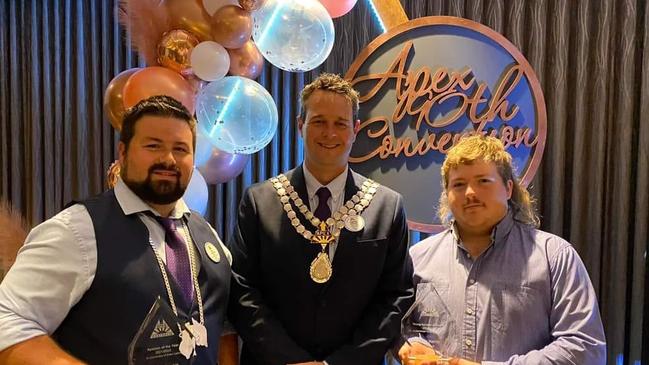Apex Australia hopes to boost profile in major cities
A once thriving service organisation is looking to get back to the top, with a focus on more city volunteers.

Leader
Don't miss out on the headlines from Leader . Followed categories will be added to My News.
Apex Australia has set its sights on rebuilding its presence in metropolitan areas after a popularity decline in major cities.
Once a giant among service organisations in Australia – boasting more than 17,400 members from 796 clubs in 1976 – the number of Apex clubs around the country currently sits at about 140 clubs, with only a handful located in major cities.
The group is described as “a vibrant and energetic volunteer service organisation focused on harnessing the ideas, ideals and intelligence of primarily younger Australians”.
Melbourne, Sydney, Gold Coast and Perth all have one club each, while Brisbane has one in the CBD with clubs nearby in Sandgate and Albany Creek.
In South Australia, Mount Barker and Gawler are the closest to Adelaide.
Apex is often seen as a young person’s entry into volunteering, with members aged between 18 and 45.
While volunteering and contributing to a community is more associated with rural areas, Apex Australia’s national president Simon Grant says there is no reason why this cannot be replicated in the cities.
“We‘re really looking to focus our efforts in major centres,” Mr Grant said.
“Generally speaking, Apex clubs around Australia are in regional communities.
“What we‘re thinking of in that regard is that regional communities have a have a better connection of people in the community.
“In in the city, people seem to have lost that connectedness with their neighbours and their community. They‘re not so engaged in their community anymore, which is something that would really like to encourage people to do and seek opportunities.”
The Hoppers Crossing club is the last Melbourne club standing, after Tullamarine folded about eight years ago.
Other former clubs include Box Hill, Melbourne, Croydon and Doncaster.
Geelong is also without a branch after its club, the world’s first founded in 1931, folded in 2015.
Mr Grant says the success of Apex clubs revolves around them being “relevant to their communities”.
“It doesn’t matter if you’re in the country or the city … you‘ve got to be able to have that that big ticket item, that project that will draw people in to say, here we are,” he said.
“For instance, the one in Perth support the Apex Australia Teenage Fashion Awards. That‘s the major project and they have dedicated members who are really passionate about that.
“The Brisbane City club are rebuilding with some great numbers moving forward.
“By locking onto a project that is relevant to the community they‘re in, they’ll attract new members.
“The big challenge for us is that in those cities where there aren‘t Apex clubs, is to establish new clubs and in order to do that we have to put some significant investment in insofar as sponsorship of the new club and support for its new members.”
Hoppers Crossing Apexian, Amanda Turner, says she would love to see a return to the “heydays” where Melbourne’s suburbs were filled with clubs.
“I have many fond memories of my first club in Diamond Valley as well as many inter clubs with Tullamarine/Essendon, Rowville and Williamstown,” she said.
“It would be great to see the number one Geelong Club chartered again too.
“Having a group of likeminded individuals come together means the sky’s the limit for what can be achieved. We have helped people from all ages and walks of life from high school students through our public speaking competition all the way through to assisting elderly citizens with work in their backyards.”
One of the Hoppers Crossing club’s current projects is fundraising for a Relay for Life team in honour of life member, Michael Nash who lost his battle to a brain tumour in 2019.
They also do joint fundraisers with the local Rotary branch and have been selling Christmas trees to Wyndham community members for 38 years, with profits put back into the community.





